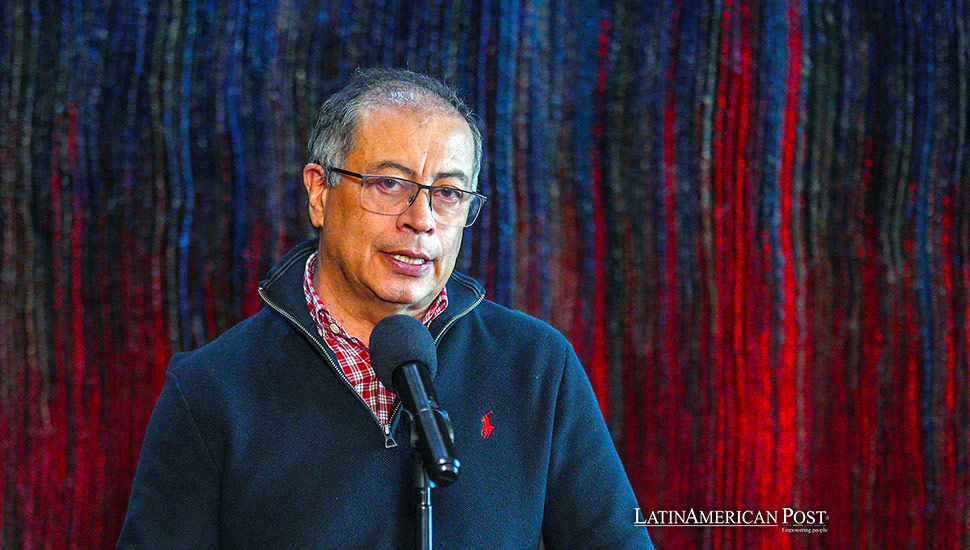Colombia’s Constitutional Debate: President Gustavo Petro’s Call for a Constituent Assembly Sparks Controversy

Gustavo Petro advocates for a Constituent Assembly, facing pushback from political veterans and raising questions about the future of Colombia’s governance structure.
Colombian President Gustavo Petro reignited a national debate by asserting that the Congress holds the historic responsibility to process the call for a Constituent Assembly. This declaration has stirred significant controversy, especially among former presidents and political figures who argue that the current peace agreement does not authorize such a move.
Petro used his social media platform to state, “The historical role of Congress today is to process its convocation, if not the constituent power, sooner or later, will do so.” This comment was part of a longer message in which Petro elaborated on his views about the constituent power of the people and the potential means to express it, including but not limited to a Constituent Assembly.
Petro first proposed convening a Constituent Assembly in March, suggesting it could transform institutions to align with the people’s mandate for peace and justice. He argued that such a transformation is achievable in Colombia, a country with a complex history of conflict and attempts at peace.
Diverse Political Reactions
The proposal has met with a range of reactions. Many political factions have labeled it risky, advocating instead for the defense of the 1991 Constitution, a progressive document in whose drafting Petro’s former guerrilla group, M-19, played a significant role after signing a peace agreement with the government.
Former President Juan Manuel Santos, who signed the 2016 peace agreement with the FARC, was particularly vocal. He deemed using the peace agreement to justify calling a Constituent Assembly “absurd.” Santos emphasized that the peace agreement should not be altered and that a Constituent Assembly can only be convened through procedures established in the existing Constitution.
Santos’s sentiments were echoed by Ernesto Samper, another former president, who supports the idea of a Constituent Assembly but insists that the peace agreement does not provide the legal basis for it. Samper warned that attempting to convene such an assembly without following constitutional procedures would undermine existing institutions, including Congress and the Constitutional Court.
Historical and Political Context
The debate over convening a Constituent Assembly taps into deep currents in Colombian political history. The 1991 Constitution emerged from a similar process following decades of conflict and political upheaval. It marked a significant turning point, introducing numerous reforms to democratize the political system and protect human rights.
However, the road to the 1991 Constitution was fraught with challenges, much like the current discussions. The M-19 guerrilla group, to which Petro belonged, laid down arms and transitioned into a political party, contributing to the new constitution. This period was characterized by significant negotiations and the inclusion of various political and social actors to ensure a broad-based consensus.
Current Challenges and Future Prospects
Today, Colombia faces a new set of challenges. The implementation of the 2016 peace agreement has been uneven, with ongoing violence and political instability in various regions. Petro’s call for a Constituent Assembly reflects his belief that the current institutional framework is inadequate to address these issues comprehensively.
Critics argue Petro’s proposal risks exacerbating political tensions and undermining hard-won democratic gains. They caution that bypassing established constitutional procedures could lead to a constitutional crisis and further polarization.
Petro’s Vision for Transformation
Despite the criticisms, Petro remains steadfast in his vision for a transformed Colombia. He envisions a country where institutions are more responsive to the people’s needs and peace and justice are tangible realities. His call for a Constituent Assembly is part of a broader agenda to deepen democratic governance and ensure that the state serves all Colombians equitably.
Petro has also repeatedly stated that he has no intention of seeking re-election in 2026, which the Constitution prohibits. However, his frequent references to a Constituent Assembly raise questions about his broader political strategy and the mechanisms he envisions for achieving his goals.
Broader Implications for Latin America
The debate in Colombia has significant implications for Latin America, a region where many countries grapple with similar governance, peace, and justice issues. Constituent assemblies have been used in various countries to address systemic problems and implement comprehensive reforms. However, they also come with risks, including potential instability and the erosion of existing democratic frameworks.
Several Latin American countries have recently undertaken constitutional reforms to address persistent social and political challenges. These efforts often reflect broader regional trends toward greater inclusion and participation in governance. However, the success of such initiatives depends on careful planning, broad-based consensus, and adherence to democratic principles.
Navigating a Complex Path Forward
As Colombia navigates this complex path forward, the discourse around a Constituent Assembly will likely continue to evoke strong opinions and debates. The country stands at a crossroads, with the potential for significant transformation or deepened division.
The role of Congress, the judiciary, and civil society will be crucial in determining the outcome of this debate. Ensuring that constitutional reforms are conducted transparently and inclusively will be vital in maintaining stability and advancing the interests of all Colombians.
Also read: Colombia Opens Embassy in Ramallah Amid Shifting Diplomatic Ties
Colombia’s journey towards potential constitutional reform is a testament to its ongoing struggle for peace and justice. As the nation debates the merits and risks of a Constituent Assembly, the lessons from its past and the aspirations for its future will continue to shape its path.





